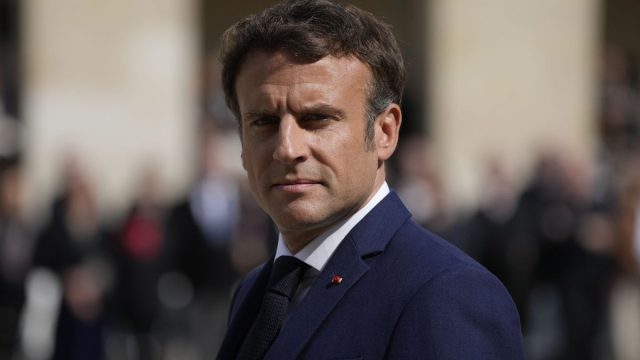Worker’s strike at the refineries, fuel shortages, a considerable increase in the cost of living, a war regime, a leftist march and, this week, a «generalized» strike. Quite a cocktail that demonstrates the deep social unrest that has heated up the political sphere for days and opens a new flank of protests, not only in France, but possibly throughout Europe.
With an economy with a reserved forecast and political instability on the continent that has led to the unprecedented victory of the extreme right in Italy, as well as the resignation of Liz Truss as Prime Minister of the United Kingdom, a few weeks before forming a government, Emmanuel Macron is also suffering, firsthand, the political consequences of the Ukrainian conflict.
The final destination of this convulsion is a question that the world has in its lips and that few know how to answer, explains the sociologist Ociel Alí López in an opinion piece for RT.Worker’s strike at refineries and nuclear plants in France
Several refineries and nuclear plants have been on strike in recent weeks. The actions that affect the ExxonMobil company began on September 20 and those of TotalEnergies, began on the 27.
In the nuclear sector, ED, the main French power utility company, has struggled to restart several reactors, due to the same labor dispute centered on the demand of wage increases.
This has led to the huge lines of cars waiting to fill their tanks with gasoline, which we have witnessed through viral videos, as well as the surprising shortages at many fuel stations.
One of the main arguments of the strikers to justify their call is the disproportionate increase in the profits of the oil companies and their senior officials during the energy crisis, for which they ask that a special tax be applied to them.
In the midst of this chaotic situation, the demonstration last Sunday, prior to the strike, achieved the task of the left to take back the streets, as well as a demonstration of the power of mobilization and unity around the leadership of Jean-Luc Mélenchon, who considered it «successful».
The ground was thus prepared for a strike that the organizers described as «generalized» so as not to give it the definitive value that the signifier «general strike» confers.’Widespread’ strike
On Tuesday, the strike called by trade unions and leftist movements, such as la France insoumise(La Francia Insumisa), took place. It is the first of its kind in this new cycle of protests. The main demand of this action is focused on the increase in wages, and was carried out in various key sectors such as the oil, transportation and nuclear sectors, among others, and demonstrated that the articulation between various social segments can go beyond marches and the “yellow vest” style protests, a movement that collapsed the country four years ago and burst, as well, onto the scene this autumn.
The plus, the difference with that moment, if you will, is that the left wing sectors have united politically and managed to break Macron’s majority in recent legislative elections, which means there is a strong debate in the wind in the near future for the approval of the national budget.
Although the president won the presidential election six months ago, the social situation is rapidly worsening and the left shows that it is prepared to lead the social unrest, given the harmful circumstances that are affecting large sectors of the population.
Of course, for this, the left will have to have patience and establish long-term strategies, while it is forced to retake the historical bastions that the extreme right has stolen from it.
Very likely the conflict will grow in the midst of a destabilized Europe.The situation in Europe
This French response to the crisis encourages «left populism», led by Mélenchon, which opens up the possibilities of a way out of the crisis from a perspective contrary to what happened recently in Italy, with Meloni’s victory and also, as might be expected , in France itself, due to the advance of the also extreme right-wing Marine Le Pen, who in the presidential elections managed to reach the second round and who has territorialized popular spaces that traditionally identified themselves with the left wing sectors.
The rise of leftist mobilizations against Macron’s liberalism is also a check against the growth of the radical right.
Both the electoral result in Italy and the mobilizations in France show that Europe is looking for solutions to the crisis that do not go through the liberal rationality that the establishment is willing to allow, and that, if the conditions continue, will allow the emergence of populist, extremist or alternative formulas.
In any case, the resignation of Liz Truss in the United Kingdom makes the entire continent see that radicalizing liberalism is not going to lead to greater stability, so populism, from the left and right, may be making its way, which would be a headache for the ‘status quo’.
These mobilizations and strikes called by the most radical left, in the midst of the explosive situation, can engender a politically ‘hot autumn’ that will bring replicas in other parts of Europe.
The fuel crisis has led the French Economy Minister, Bruno Le Maire, to openly criticize the US for the price at which that country sells natural gas, a discomfort that is beginning to manifest itself at various levels and not only in the workers that participate in the strikes.
«We cannot accept that our American partner sells LNG (liquefied natural gas) four times more expensive than the price at which it is sold to its industries», claimed Le Maire a few days ago.
The cut in oil production that the Organization of Petroleum Exporting Countries (OPEC) ruled at the beginning of October affects Europe in a privileged way and, from now on, will be a decisive issue for the euro to continue losing weight in relation to the dollar .
France is in danger of becoming «Latin Americanized», and these strikes, conflicts and riots that have been experienced in recent days accentuate the trend not only of macroeconomic destabilization, but also of mobilization as a result of the social unrest that has been generated for years, but that Macron has been able to surf with some ease.
The great problem of the French president is that the current situation is not the same as when he was re-elected, in that distant month of April, when the effects of the conflict in Ukraine had not yet wreaked the havoc that is already being felt in the autumn, and that can accentuate during the near winter.
The world does not know where France is going, but the trend is dangerous.











